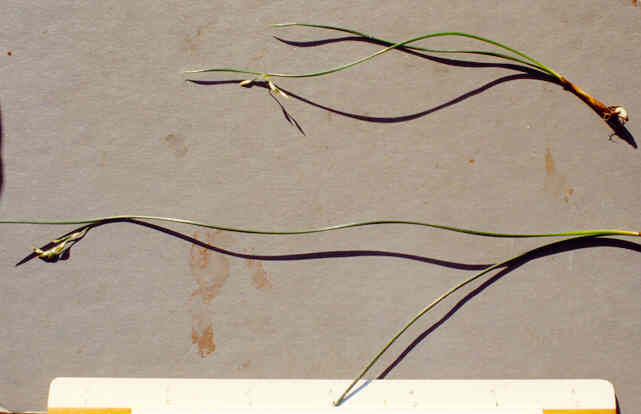
Juncus mexicanus Willd.
 |
Juncus mexicanus Willd.
Juncaceae (Rush Family)NativeMexican Rush |
May Photo
Plant Characteristics:
Perennial, 10-60 cm. tall; rhizomes heavy; stems erect or generally
spirally twisted, flattened, slender; lvs. basal; sheaths loose, appendages
short, firm; upper sheaths generally bearing 5-20 cm. blades that resemble stems
(blades less common farther north); infl. appearing lateral, +/- compact; lowest
bract 1-25 cm., cylindric, resembling stem; fls. 2-many; perianth segments 3-5.5
mm. (sepals > petals), generally acuminate, color variable, midstripe varying
in width and intensity, margins generally clear; stamens 6, filaments <<
anthers; fr. < to > perianth, ovoid, 3-angled; beak 0.3 mm.; seed 0.5-0.7
mm.; appendages 0.
Habitat:
Many Plant Communities, from cent. Calif. s. to San Diego co., White
Mts., to Tex., Mex. May-August.
Name:
Latin, name for a rush, perhaps from jungere,
to bind, the stems used for binding. (Munz,
Flora So. Calif. 909).
Mexicanus, Mexican. (Bailey
17).
General:
Rare in the study area, with only one small colony known, and this along
the lower path in Santa Ana Heights, easterly of the Delhi Ditch approx.
one-half mile. Karlin Marsh, in her
1990 study, identified two colonies of J.
mexicanus on the westerly side of the bay, one at 23rd St. and one along the
lower path between 23rd St. and Delhi. Close
examination of specimens from these colonies has convinced John Johnson and me
that these colonies are J. balticus.
(my comments). Juncus mexicanus and Juncus
balticus were used by the Kumeyaay Indians in basket making. (Campbell 109).
Juncus mexicanus was also used to make brushes used for cleaning inside a
house or for sweeping the particles of meal produced during the pounding of
seeds. Juncus species are often found growing in meadows and swales mixed
with grasses and sedges and are of some importance for hay and pasture.
(Munz, Flora So. Calif. 909).
Text Ref:
Hickman Ed. 1164; Munz, Flora So.
Calif. 912; Roberts 44.
Photo Ref:
May-Aug 94 # 6.
Identity: by R. De Ruff,
confirmed by John Johnson.
Computer Ref: Plant Data 468.
Have plant specimen.
Last edit 9/21/02.